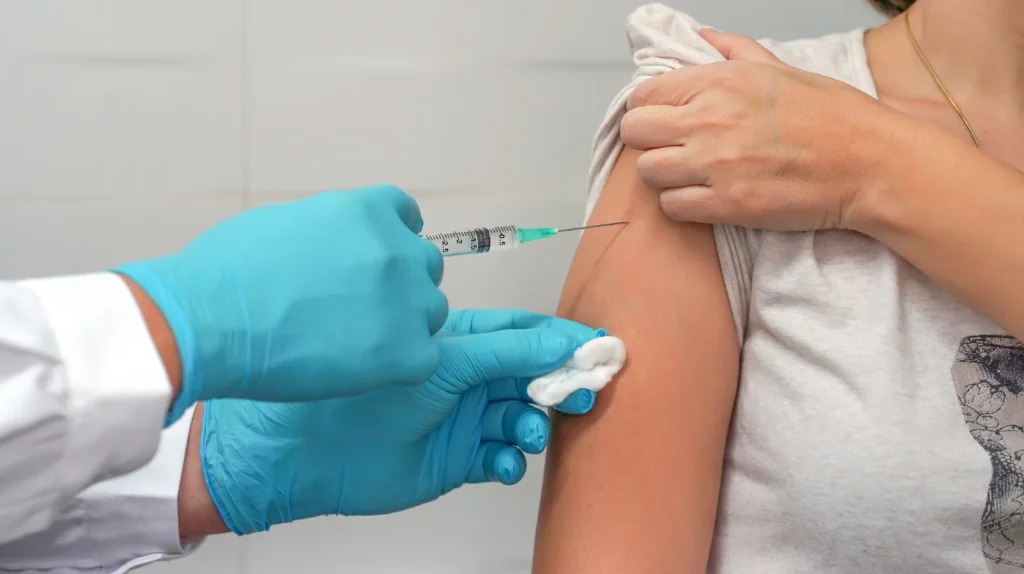
Pregnancy is a time filled with joy, anticipation, and meticulous care. One aspect that often raises questions among expecting mothers, particularly in India, is vaccinations. As a doctor, I see firsthand the concerns, confusion, and misconceptions surrounding vaccines during pregnancy. So, why are vaccinations such an integral part of prenatal care?
The answer lies in protecting both the mother and her unborn child from preventable diseases like tetanus, pertussis (whooping cough), and influenza. Vaccinations during pregnancy in India are more than just a medical recommendation; they’re a lifeline that can shield you and your precious little one from potential health risks. In this comprehensive guide, we’ll explore the recommended vaccines, understand their importance, and address the pressing concerns about vaccine safety for pregnant women in India. Whether you’re planning to become pregnant or are already on this beautiful journey, this guide will empower you with the knowledge to make informed decisions about your health and your baby’s well-being.
Why Is Vaccination Important for Pregnant Women in India?
In India, vaccination during pregnancy is not just a routine healthcare measure but a vital necessity. Here’s why:
- Protection for Mother and Baby: Vaccines offer a double shield of protection. The vaccinated pregnant woman is less likely to contract preventable diseases like tetanus or whooping cough, and the immunity is also passed to the baby, providing vital protection in the early weeks of life.
- Preventing Neonatal Tetanus: India has seen significant cases of neonatal tetanus, a life-threatening bacterial disease. Vaccination with tetanus toxoid during pregnancy has been instrumental in eliminating this condition.
- Avoiding Seasonal Illnesses: Flu seasons can be particularly harsh on pregnant women. Influenza vaccination during pregnancy ensures that the woman does not suffer severe flu symptoms, which can sometimes lead to hospitalization.
- Community Safety: Immunization during pregnancy contributes to overall community health by reducing the spread of contagious diseases like pertussis.
- Alignment with National Immunization Schedule: The Indian government, along with the World Health Organization, has specific guidelines for immunizing pregnant women. Following these guidelines ensures alignment with national health priorities.
By embracing vaccinations, pregnant women in India contribute to their well-being and that of their babies, as well as support larger public health initiatives.
What Vaccines are Recommended During Pregnancy in India?

Three vaccinations are generally recommended for pregnant women in India. These vaccines include Tetanus Toxoid (TT), Tdap (Tetanus, Diphtheria, and Pertussis), and the Influenza vaccine.
1. Understanding Tetanus: Why Is Tetanus Toxoid Essential for Pregnant Women?
Why Tetanus Toxoid for Pregnant Women?
- Protection Against Maternal and Neonatal Tetanus: Maternal tetanus can lead to fatal outcomes, and neonatal tetanus is a significant health concern in developing countries, including India. By receiving the Tetanus Toxoid vaccine, pregnant women can protect themselves and their newborns from this life-threatening condition.
- Aligns with Government Guidelines: The National Immunization Schedule in India recommends 2 doses of Tetanus Toxoid during pregnancy to ensure immunity.
- Safety and Effectiveness: This vaccine has been thoroughly assessed for safety during pregnancy and is an effective measure to prevent tetanus infection.
To prevent Tetanus, the national immunization schedule in India recommends the Tetanus Toxoid (TT) vaccine for pregnant women. It is advised to receive at least two doses of TT injection during pregnancy, with a minimum of 28 days between doses. If the woman’s immunization status is unknown or she has not been previously vaccinated, two doses should be given before delivery, with the second dose completed four weeks before delivery.
For subsequent pregnancies with a gap of fewer than three years, one booster dose of TT injection suffices. If the gap is more than three years, two doses are required. TT vaccination is a crucial step in preventing Tetanus infection and ensuring the well-being of both mother and child.
2. The TDAP Vaccine: What Does It Protect Against and Why Is It Crucial?
The Tdap vaccine is a combination vaccine that protects against Tetanus, Diphtheria, and Pertussis (Whooping Cough). This vaccine is particularly significant during pregnancy for multiple reasons:
What Makes TDAP Essential?
- Pertussis Protection: Whooping cough can be especially severe in infants. By getting vaccinated during pregnancy, a mother can pass protective antibodies to her newborn. The antibodies transferred from the mother to the fetus offer protection to the baby during the initial months of life when they are most vulnerable to Pertussis.
- Repeat Immunizations: Unlike other vaccinations, TDAP is recommended during every pregnancy, even if a woman has received it before.
- Alignment with Worldwide Health Recommendations: Following the immunization schedule, including the TDAP vaccine, contributes to individual and community health.
- TT Replacement: Tdap vaccination can replace the second dose of TT injection and provide triple protection.
The optimal time to administer the TDAP vaccine is between 27-36 weeks of pregnancy, as this ensures higher antibody levels in the fetus. This vaccine plays a crucial role in preventing Pertussis and its potential complications for both the mother and the newborn.
3. Influenza Vaccination During Pregnancy: Should Every Pregnant Woman Get It?
Influenza, commonly known as the flu, is a viral respiratory infection that can cause fever, cough, headache, fatigue, muscle aches, and more. Pregnant women are at higher risk of developing complications due to influenza, and it can also pose risks to the newborn, such as preterm births and low birth weights.
Why Influenza Vaccination?
- Protection from Severe Flu: Pregnant women are at higher risk of serious flu complications. The Influenza vaccine reduces this risk.
- Baby’s Health: The vaccine also provides antibodies to the baby, protecting them from flu after birth for several months.
- Seasonal Relevance: Especially during flu season, the vaccine is recommended to ensure health and wellness.
Influenza vaccination during pregnancy is strongly recommended by leading health organizations like ACOF, WHO, and CDC. The vaccine is safe for pregnant women as it is an inactivated vaccine. It is primarily recommended during the second and third trimesters, but it can also be administered in the first trimester.
These vaccines are safe during pregnancy and every pregnant woman should be immunized with these vaccines. For a more personalized approach, always consult with your doctor and follow their advice. You may also refer to our comprehensive pregnancy guide for more insights and support throughout your journey.
The article’s next sections delve deeper into each of these important vaccinations, explaining their importance for pregnant women in India.
Safety During Pregnancy: Are Vaccines and Immunizations Safe for Expecting Mothers?

The question of vaccine safety during pregnancy is common and understandably a concern for many expecting mothers.
Vaccine Safety Insights:
- Inactivated Vaccines: Most vaccines given during pregnancy, such as Tetanus Toxoid, TDAP, and Influenza vaccines, are inactivated and considered safe for both mother and fetus.
- Avoiding Certain Vaccines: Live attenuated vaccines, like the yellow fever vaccine, should generally be avoided during pregnancy.
- Consulting Healthcare Professionals: Pregnant women should always consult with healthcare providers about vaccinations, as individual recommendations may vary.
Remember, vaccines are an integral part of prenatal care, offering protection from preventable diseases. Check out Medicines When Pregnant for more information on managing healthcare during pregnancy.
The COVID-19 Vaccine: Should Pregnant Women in India Take It?
The COVID-19 pandemic has brought forth new considerations for pregnant women regarding vaccination.
Key Considerations:
- Consultation with Healthcare Providers: Each pregnant woman should discuss the COVID-19 vaccine with her healthcare provider, considering her specific situation and risk factors.
- Assessment of Risks and Benefits: Weighing the risks of COVID-19 exposure against the benefits of vaccination is essential.
- Availability of the Vaccine: As COVID-19 vaccines continue to be distributed, availability and recommendations may vary across regions in India.
The decision to receive the COVID-19 vaccine during pregnancy is an individual one, and expert guidance should be sought.
Vaccinations to Take Before Pregnancy
When planning a pregnancy, it’s essential to evaluate your vaccination status to ensure you and your future baby’s protection. Here’s a list of crucial vaccines that should be considered before pregnancy:
- MMR (Measles, Mumps, Rubella) Vaccine: As a live vaccine, the MMR vaccine should ideally be taken at least a month before conceiving, as it is contraindicated during pregnancy.
- Varicella (Chickenpox) Vaccine: If you’ve never had chickenpox or been vaccinated against it, consider this live vaccine before pregnancy.
- Hepatitis B Vaccine: If you’re at risk for Hepatitis B, this vaccine series should be completed before pregnancy to prevent potential transmission to the baby.
- HPV (Human Papillomavirus) Vaccine: This vaccine is advised for women who will be pregnant up to the age of 26 to prevent cervical cancer and genital warts.
It is advisable to discuss your vaccine history and requirements with your doctor to understand what vaccinations you should get before pregnancy. Pregnant women should be counseled and tailored to their unique needs and risk factors.
Vaccinations Contraindicated in Pregnancy
Not all vaccines are suitable for pregnant women. Certain vaccines should be avoided due to potential risks to the developing baby. Here’s a list of contraindicated vaccinations during pregnancy:
- MMR (Measles, Mumps, Rubella) Vaccine: As mentioned, MMR is a live attenuated vaccine and should generally be avoided during pregnancy.
- Varicella (Chickenpox) Vaccine: Another live vaccine, Varicella, should be avoided as well.
- HPV (Human Papillomavirus) Vaccine: The HPV vaccine is not recommended during pregnancy.
- Yellow Fever Vaccine: This live vaccine is only given to pregnant women at high risk of exposure to the virus.
- Live Attenuated Influenza Vaccine (LAIV): The inactivated influenza vaccine is preferred during pregnancy rather than the live version.
Pregnancy is a delicate time when certain precautions must be taken. Ensuring the safety of vaccines or toxoids requires a discussion with healthcare professionals. They will guide you in understanding which vaccines you should receive and which to avoid to ensure a healthy pregnancy and baby.
How are Vaccines Like Tetanus and Diphtheria Administered?
The administration of vaccines, particularly those protecting against Tetanus and Diphtheria, follows a standard protocol to ensure safety and efficacy:
- Pre-Screening: Healthcare providers assess the pregnant woman’s health and vaccination history to determine the appropriate vaccines and timing.
- Dose Administration: Tetanus Toxoid and TDAP vaccines are typically administered via intramuscular injection in the upper arm.
- Monitoring: After receiving the vaccine, patients are often monitored for a short period to ensure no immediate adverse reactions.
- Follow-Up Schedule: Some vaccines may require multiple doses, and a follow-up schedule will be provided to ensure complete protection.
Consult Guide to Pregnancy Trimesters for more details on what to expect during pregnancy.
Key Takeaways
Safety Assurance: Most vaccines administered during pregnancy are inactivated and safe for both mother and child.
Dual Protection: Vaccinations protect not only the pregnant woman but also provide passive immunity to the infant.
Adherence to Schedule: Following the recommended immunization schedule in India ensures complete protection against preventable diseases.
Individual Consultation: Personalized assessment and expert guidance are crucial, especially regarding the COVID-19 vaccine.
Importance of Vaccination: Vaccines like TT, TDAP and Influenza are vital for preventing serious illnesses that could affect both mother and baby.
Final Thoughts
Vaccinations during pregnancy in India are more than a precaution; they are an essential component of prenatal care. They ensure the health and safety of both the expecting mother and her young infant. By following the recommended schedule, consulting healthcare providers, and understanding the role of each vaccine, pregnant women can ensure a safer and healthier pregnancy. The role of vaccines in the life of an expecting mother is profound, symbolizing an informed and empowered approach to motherhood.
The ongoing advancements and research in vaccine development also promise a brighter future for maternal and child healthcare, highlighting the importance of vaccination during pregnancy in contemporary healthcare systems. Together, the healthcare community and expecting mothers can strive for a healthier generation, safeguarded against preventable diseases.
FAQs about vaccinations during pregnancy in india
What vaccines are recommended for a pregnant woman in India?
Tetanus Toxoid, TDAP vaccine, and Influenza vaccine are commonly recommended for pregnant women in India.
Why is the TDAP vaccine during pregnancy vital?
The TDAP vaccine protects against tetanus, diphtheria, and pertussis (whooping cough). It’s essential during pregnancy to provide passive immunity to the baby.
Are vaccinations safe for pregnant women?
Yes, most vaccinations are safe during pregnancy, including inactivated vaccines like TDAP and Tetanus Toxoid.
When should a pregnant woman get a TDAP vaccine?
A pregnant woman should receive the TDAP vaccine in the third trimester, at least 2 weeks before the baby gets his own vaccination.
Can a pregnant woman have live vaccines?
Live attenuated vaccines should generally be avoided, but inactivated vaccines are considered safe during pregnancy.
Is the Influenza vaccine during pregnancy necessary?
Yes, the influenza vaccine is available and advised during pregnancy to help protect both the woman and her infant.
How can vaccination during pregnancy prevent adverse pregnancy outcomes?
By following the recommended immunization schedule for children and pregnant women, vaccination can prevent infections that may lead to adverse pregnancy outcomes.
What is the role of Tetanus Toxoid in immunization during pregnancy?
Tetanus Toxoid is vital in immunization during pregnancy, as tetanus is a life-threatening bacterial infection that can affect both mother and baby.





